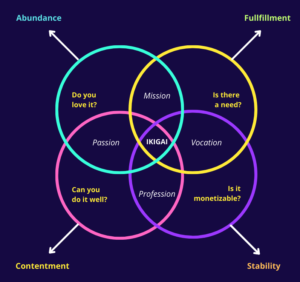Navigating with purpose in business
By Nitin Raj

Our self-identity is a collection of stories profoundly influencing the way we carry ourselves. Most people possess multiple identities, each tied to a distinct narrative. For example, one may have a professional identity shaped by career-related stories and a personal identity influenced by family, friends, and relationships. These identities can either conflict or complement, depending on how we construct, prioritize, and connect them. Within this coexistence, our sense of purpose often emerges as a guiding narrative to inform our choices.
The concept of purpose itself has evolved, transitioning from survival to the pursuit of meaning, reflecting shifts in culture and society. Today, people seek greater meaning and fulfillment in both their personal and professional lives, and this pursuit may continue to evolve.
This transformation is notably evident in the business world, where companies are increasingly expected to operate with a broader sense of purpose beyond profit1, responding to the growing demand for fulfilling work aligned with personal values.
What is purpose?
 Purpose is the sense of being part of something greater than oneself, leading to high levels of engagement, creativity, and collaboration. Unlike a goal or accomplishment, purpose is a forward-looking intentionality that can never be fully achieved. For instance, being a caring parent is a purpose, while seeing your children graduate is a goal. Purposeful individuals tend to experience a sense of fulfillment irrespective of external circumstances, making them more attractive to others.
Purpose is the sense of being part of something greater than oneself, leading to high levels of engagement, creativity, and collaboration. Unlike a goal or accomplishment, purpose is a forward-looking intentionality that can never be fully achieved. For instance, being a caring parent is a purpose, while seeing your children graduate is a goal. Purposeful individuals tend to experience a sense of fulfillment irrespective of external circumstances, making them more attractive to others.
What does purpose do to businesses?
Clarity of purpose often correlates with business growth2. Employees report finding their work more meaningful, and purpose-driven companies tend to be more profitable3, with engaged employees and loyal customers4. They also excel in innovation and transformational change.
“Purpose is the sense of being part of something greater than oneself, leading to high levels of engagement, creativity, and collaboration. Unlike a goal or accomplishment, purpose is a forward-looking intentionality that can never be fully achieved.”
While the sense of purpose is subjective, it’s correlated with higher net worth, self-reported income5, and lower levels of impulsivity. The purpose is deeply rooted in a strong culture and executives who prioritize it in strategy and decision-making report greater success in driving innovation, transformational change, and consistent revenue growth6. Purpose can guide various aspects of an organization, from marketing and HR to governance and strategy. It helps attract and retain customers, and employees7, enhances environmental and social performance, and shapes resource allocation and risk management8.
How to live with purpose?
Understanding your purpose requires exploring your personal stories and connecting with your emotions. It means being honest with yourself and your organization and making sure that your purpose is relevant, achievable, and aligned with your core values. Living with purpose means finding what truly brings you happiness and passion, incorporating it into your daily life, being a value creator, and connecting with others to make a positive impact.
Purpose at workplace
Creating purpose in the workplace is vital, not just for individuals but for organizations as well. One way to find purpose is through the Japanese concept of Ikigai, which asks you to consider what you love, what you’re good at, what the world needs, what you can be paid for, and what you find fulfilling.

Creating purpose within your organization goes beyond mission statements and vision boards; it involves aligning actions and decisions with what truly matters. Purpose is the result of balancing the desire for happiness with the practical need for survival. It places a premium on leadership, requiring leaders to address uncomfortable truths and tensions. Effective leaders keep the bigger picture in mind, ensuring that their actions align with their values.
Determining your organization’s purpose is a fundamental business decision that must be anchored in strategy. Purpose transcends siloed thinking and needs to be embedded in behavior. By effectively communicating the rationale behind your purpose, it can infuse your company’s DNA and serve as a guiding principle for decision-making.
“Purpose transcends siloed thinking and needs to be embedded in behavior. By effectively communicating the rationale behind your purpose, it can infuse your company’s DNA and serve as a guiding principle for decision-making.”
A successful company’s purpose is to be purpose-driven. Without it, organizations and individuals can feel lost and unfulfilled. Organizations can ensure that their action and decision aligns with their purpose. This involves exploring personal stories, connecting with emotions, and ensuring that actions align with values across the employee level. By grounding themselves in purpose, both individuals and organizations can achieve greatness and live fulfilling lives.
References
1 https://www.ey.com/en_gl/purpose/why-business-must-harness-the-power-of-purpose
2 https://www.iese.edu/insight/articles/clear-purpose-drives-performance/
3 https://www.forbes.com/sites/caterinabulgarella/2018/09/21/purpose-driven-companies-evolve-faster-than-others/?sh=c92545855bcf
4 https://www.forbes.com/sites/afdhelaziz/2020/06/17/global-study-reveals-consumers-are-four-to-six-times-more-likely-to-purchase-protect-and-champion-purpose-driven-companies/?sh=3e430ca3435f
5 https://www.ncbi.nlm.nih.gov/pmc/articles/PMC5408461/
6 https://www2.deloitte.com/us/en/insights/topics/marketing-and-sales-operations/global-marketing-trends/2020/purpose-driven-companies.html
7 https://www.forbes.com/sites/daniellebrooker/2019/02/28/employees-need-purpose-more-than-pay-to-be-happy-and-productive/?sh=224714be7088
8 https://hbr.org/2019/11/balancing-the-companys-needs-and-employee-satisfaction